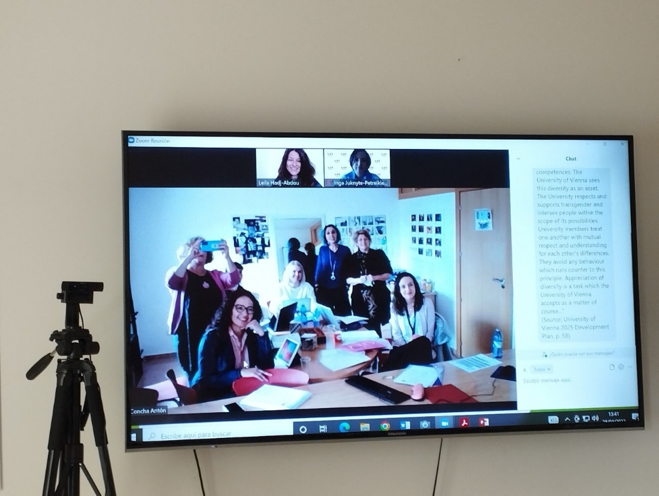Do you know the meaning of Cultural Diversity?
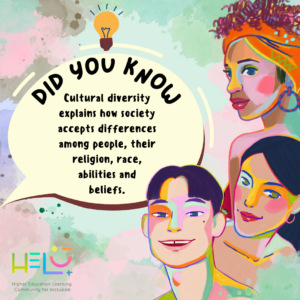
Cultural Diversity explains how society accepts differences among people, their religion, race, abilities, beliefs, etc. Continue reading “Cultural Diversity”
Higher Education Learning Community for Inclusion
Do you know the meaning of Cultural Diversity?

Cultural Diversity explains how society accepts differences among people, their religion, race, abilities, beliefs, etc. Continue reading “Cultural Diversity”
“La Merced Migraciones”, partner of the Helci Project, presents this documentary: Resistencias, full of real stories about migrants and/or refugees belonging to the LGTBIQ+ collective.
The second TLC coordinators online meeting took place the 19th of December 2022, with the participation of the University of Salamanca, Continue reading “19/12/2022”
With the participation of eight experts from different Universities (University of Salamanca, University of Wien, Mykolas Romeris University, Complutense University of Madrid) and representatives from others institutions and NGOs (OBERAXE, Zara Training) , the third TLC meeting took place.
During the course of the meeting, a wide rage of developments took place. Preliminary results of the online survey, which asses the perception of the students, were presented to the rest of the partners. All this work will be necessary to move on to the next step, the focus groups. Therefore the members proposed and discussed certain ideas, enabling the progress of the project. They agreed the importance of outreach to students, who seems not to trust University as a safe space.
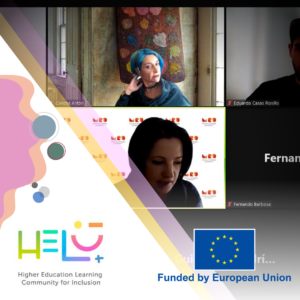
On the 13/10/2022 the first online TLC Coordination meeting was held, strengthening commitment of all the project partners. The proposed UCL guide is presented to all the members, laying the foundations of the project.
The consortium, responsible of the project, is: The University of Salamanca (as coordinator), the University of Wien (Austria), the University of Mykolo Romerio from Vilnius (Lithuania), the Spanish Observatory against Racism and Xenophobia (OBERAXE) and Dinamia S. Coop
The second meeting of the Transnational Learning Community was held on 26/09/2022. The participants had the opportunity, above all, to share the progress made by Working Group 1, which is responsible for supporting the development of the Methodological Guide.
The project’s consortium includes human rights activists, researchers from different universities and representatives of NGO House of Diversity and Education, Zara Training, Black Voices Volksbegehren, Kaunas’ County Women Crisis Centre and La Merced Migraciones.
Throughout the meeting, important contributions were received on the proposals launched by Working Group 1 and progress was made in the development of the questionnaire to assess the perception of the students of the participating universities (University of Salamanca, University of Vienna and Mykolas Romeris University) on inclusion in their respective university environments.different working commissions were proposed.

On 21/06/2022 the first meeting of the Transnational Learning Community was held, with the participation of 19 people including human rights activists, researchers from different universities (University of Salamanca, University of Vienna, Mykolas Romeris University, Complutense University of Madrid, University of Singapore) and representatives of NGO House of Diversity and Education, Zara Training, Black Voices Volksbegehren, Kaunas’ County Women Crisis Centre and La Merced Migraciones.
In this meeting, the objectives of the community in relation to the project were established, the working methodology of the TLC, aspects linked to the methodological guide were discussed and different working commissions were proposed.
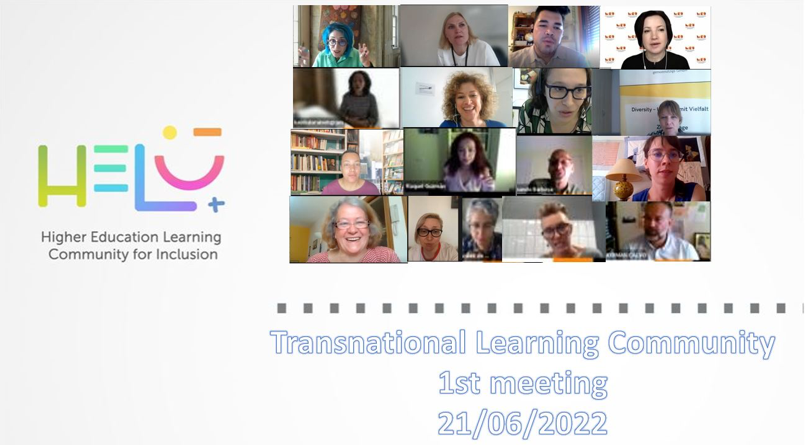
Throughout the months of May and June, the organisations of the consortium have developed different activities to present the project with the aim of involving the university communities and other potential allies.
In May, the Spanish Observatory on Racism and Xenophobia published the news of the launch of the project in the highlights section of its website.

Mykolas Romeris University held a virtual presentation of the project attended by 26 participants from the university community (Presentation).
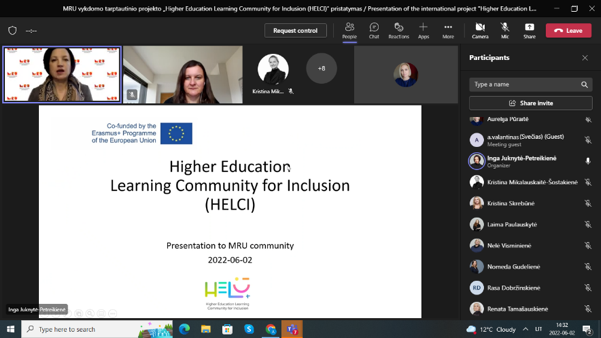
From the University of Vienna, the presentation meeting was timed to coincide with the inclusion of the project on their website. (Presentation)
The presentation of the project at the University of Salamanca took place within the framework of an awareness-raising conference on affective and sexual diversity. It was attended by 23 members of the university community (Video).
In 2022, the HELCI project (Higher Education Learning Community for Inclusion) has started, co-financed by the Erasmus Plus program of the European Union.
Despite the progress and development of the “acquis communautaire” on Equality and Non-discrimination by the European Union, unequal treatment, racism and xenophobia, as well as other serious forms of intolerance have been growing within the European societies, as long as the continuous crises (economic, migratory and pandemic) have been exacerbating competition for public resources, elitism and hate speech and intolerance. Several studies and researchs have concluded that Universities are still places where discrimination (by gender, ethnic origin, sexual orientation, etc.) is unfortunately a regular phenomena.
The main goal of the project is to promote non-discrimination principles and European common values in Higher Education, boosting connections among Universities of different countries and elaboration (on co-production way) of inclusive and innovative contents that counteract xenophobic and racist speeches as well as other forms of intolerance, that Europe is facing.
Among its activities, the constitution of a Transnational Learning Community (TLC) stands out. TLC will meet virtually on a regular basis and will include experts from Universities, social movements and public institutions interested in promoting a roadmap to turn European Universities into truly inclusive Universities. and free from all kind of discriminations
The consortium, responsible of the project, is: The University of Salamanca (as coordinator), the University of Wien (Austria), the University of Mykolo Romerio from Vilnius (Lithuania), the Spanish Observatory on Racism and Xenophobia (OBERAXE) and Dinamia S. Coop
A first meeting took place in Salamanca past April 28th
